Two months after watching The Yes Men Are Revolting (Directed by Laura Nix and The Yes Men, 2015, 91 mins.) together at the local cinema in Columbus, Ohio, I interviewed the five others in my group about their recollections of the shared experience.
The following is a text relaying between our Yes Men conversations and Bertolt Brecht’s thoughts on the potential of art to make the familiar strange and, thereby, to change the world for the better as exemplified by his theory of the A-Effect (aka Alienation Effect and Verfremdungseffekt). Ultimately, this movie review and art criticism experiment was fomented by the reality of my being deep in the throes of preparing to teach Brecht’s A-Effect to graduate students when I happened to see the new documentary and realized the radical ties that The Yes Men have to Brecht.
“Oil, inflation, war, social struggles, the family, religion, wheat, the meat market, all became subjects for theatrical representation. Choruses enlightened the spectator about facts unknown to him. Film clips showed a montage of events from all over the world. Projections added statistical material. And as the ‘background’ came to the front of the stage so people’s activity was subjected to criticism. Right and wrong courses of action were shown. People were shown who knew what they doing and others who did not. The theatre became an affair for philosophers, but only for such philosophers as wished not just to explain the world, but also to change it.” Bertolt Brecht [1]
Interview with Kid Carlo Brown
What do you remember most vividly from ‘The Yes Men Are Revolting’?
K: When they got to stick each other’s head up each other’s ass in the polar bear.
What was the significance of using a polar bear?
K. Because of global warming polar bears are drowning.
Can you elaborate?
K. They’re drowning from oil and gas companies making it warmer and melting the ice, like the North Pole.
The Yes Men acted like the polar bear was a gift from the Russian company Gazprom to the Dutch company Shell in order to bring scrutiny on how both are drilling in the Arctic.
Do you remember Gazprom resurfacing in our lives when the U.S. won the FIFA World Cup? Since Gazprom paid so much money to FIFA, it got its name all over the stadium and broadcast, and the players were practically swallowed whole by the oil monster. What do you think of the U.S. women’s soccer team being associated with a corporation like Gazprom?
K: I don’t think they really have anything to do with it. I think it’s just the owner wanted the money since he’s like a crook, he’s one of those people who just take money. He’s fine with anything going on. It’s not really the player’s fault. They’d probably still play soccer. They don’t even really notice it because they’re concentrated on the game, not on some stupid advertisements.
“…criticism of the world is active, practical, positive…Criticism of society is ultimately revolution…” Bertolt Brecht [2]
Who are The Yes Men?
K: They’re people who don’t like what Shell and the other gas companies are doing, so they protest peacefully and make big dents to stop global warming. They’re getting less and less people to go along with gasoline and stuff…and they’re getting more and more people to use wind power, solar power, water power, and a couple other powers. They protest in a different way than most. Instead, they mainly do stuff that’s funny and a little bit odd but not violent at all. They’ve been arrested by the police multiple times. I wonder if I can get arrested by the police multiple times. They said they’d give me a Happy Meal.
So they use humor. Is there a name for that kind of humor?
K: Rude humor I think!
What other words come to mind regarding The Yes Men?
K: Protestors, naturalists, environmentalists, archaeologists, paleontologists…
Why do they do what they do?
K: So it’s not really bad in the future. To make sure the world’s a better place for their kids / the next generation.
“The stage began to tell a story. The narrator was no longer missing, along with the fourth wall. Not only did the background adopt an attitude to the events on the stage— by big screens recalling other simultaneous events elsewhere, by projecting documents which confirmed or contradicted what the characters said, by concrete and intelligible figures to accompany abstract conversations, by figures and sentences to support mimed transactions whose sense was unclear—but the actors too refrained from going over wholly into their role, remaining detached from the character they were playing and clearly inviting criticism of him.” Bertolt Brecht [3]
Interview with Blaze
What do you remember most vividly?
B: The NYC protest scene in the East River with everyone floating in the big bio suits that they were going to have to depend on in the wake of global warming. [Wikipedia: On September 22, 2009 the Yes Men demonstrated on the alleged behalf of Halliburton and dozens of other climate threatening corporations an inflatable ball-shaped costume known as the SurvivaBall, claiming it was a self-contained living system for surviving disasters caused by global warming.]
Why?
B: It was funny. It was dramatic. It was farcical and impactful of “look, we’re all going to have to live in a bubble if we don’t take care of the planet.”
Do you have a next favorite scene or memory?
B: The Shell Oil thing when the oil came flying out of the cake.
How did that happen?
B: Do you remember that scene!? They were doing this presentation that was heavily staged. I think that there were some actual representatives of Shell Oil and other bureaucratic and administrative people in the audience. I liked the drama and the fun, spirited way of protesting. [Wikipedia: In June 2012, The Yes Men collaborated with Greenpeace and members of the Occupy Seattle movement to create ArcticReady.com, a parody website criticizing Shell Oil’s drilling activities in the Arctic Circle. The website launch was commemorated by a fake launch party held in the Seattle Space Needle.]
Their actions are based on being impostors and masquerading as other individuals. Why pretend to be somebody else?
B: It’s their method to really get attention. If The Yes Men can pull off the façade of the different individuals they’re impersonating and be credible in the eyes of the press then their message has the potential to spread widely. It’s part of their creative process and part of their brainstorming of “how can we get this to the most people” and so they take risks (of course they do have lawyers but…) by being impostors in some really high profile situations in order to make that happen.
“Once the idea of total transformation is abandoned the actor speaks his part not as if he were improvising it himself but like a quotation. At the same time he obviously has to render all the quotation’s overtones, the remark’s full human and concrete shape; similarly the gesture he makes must have the full substance of a human gesture even though it now represents a copy.” Bertolt Brecht [4]
Why do they do what they do?
B: Because they care. They are brave. Early on they saw what was happening, particularly on an environmental front. They saw that standard activism was not as dramatic so they were creative. They loved each other number one and they loved the cause number two so they were a good partnership to really push boundaries and to find really creative ways to try to open up eyes.
“And the learning process must be coordinated so that the actor learns as the other actors are learning and develops his character as they are developing theirs. For the smallest social unit is not the single person but two people. In life too we develop one another.” Bertolt Brecht [5]
B: Ultimately, the most impactful scene was in Canada when Indigenous activist Gitz Crazyboy [Blackfoot Nation] gave The Yes Men a tour of his ancestral lands that had been raped and pillaged [Alberta’s tar sands]. As a massage therapist and musician I am drawn to questions of healing and spirit as well as of course to healing and bodies (still working on my own mind!). That was really, really moving…
Interview with Ishtar
What do you remember most vividly from ‘The Yes Men Are Revolting’?
I: The end of the movie when The Yes Men pretended to be public figures from a particular agency that specific industry people had come to hear speak in a formal setting. The Yes Men showed that the industry representatives in attendance were willing to embrace a proposal which was basically antithetical to their business interests. Didn’t it have to do with the military industrial complex?
It was defense contractors and other invested parties at a Homeland Security conference. The Yes Men pretended that General Colin Powell would appear but was running late and meanwhile “his colleague” Undersecretary of Policy Implementation at the Department of Energy Mr. Benedict Waterman could make it and that was The Yes Men Andy Bichlbaum in the wig (modeled after U.S. Energy Secretary Ernest Moniz). Then he gave the presentation about switching entirely to renewable energy sources and claimed that they would be owned and operated by Indigenous people. That’s when the two collaborators, Gitz Crazyboy and Tito Ybarra [Red Lake Band of Ojibwe], came into play. [In this particular action called AmeriCan the two Yes Men pose as Bureau of Indian Affairs representatives.]
“The achievement of the A-effect constitutes something utterly ordinary, recurrent; it is just a widely-practised way of drawing one’s own or someone else’s attention to a thing, and it can be seen in education as also in business conferences of one sort or another. The A-effect consists in turning the object of which one is to be made aware, to which one’s attention is to be drawn, from something ordinary, familiar, immediate accessible, into something peculiar, striking and unexpected. What is obvious is in a certain sense made incomprehensible, but this is only in order that it may then be made all the easier to comprehend. Before familiarity can turn into awareness the familiar must be stripped of its inconspicuousness; we must give up assuming that the object in question needs no explanation. However frequently recurrent, modest, vulgar it may be it will now be labelled as something unusual.” Bertolt Brecht [6]
I: They all gathered in a circle and I think they might have even sung a song. It was a little bit of a pow wow experience. I don’t know…that was rather incredible. You saw that the people on both sides of the table, if told by their superiors that the industry is going to rely on alternative energy, are more than happy to embrace the concept.
Even the person from Northrop Grumman gave The Yes Men his business card!
I: I have two thoughts about it. It shows that people are very interested in alternative energies, especially if leadership tells them that’s the direction they’ll be headed, but it also shows that perhaps these people would likewise embrace ANYthing the leadership tells them. They’re conformists. They’re in jobs to get paid and not necessarily to do work that is a moral imperative to them. On one hand they were embracing this more benevolent concept of alternative energy and giving the Native Americans a piece of the pie, but at the same time well, you know, in that setting maybe they would have embraced ANYthing given to them. So, it if had been a group of people saying “OK, we’re going to rely on nuclear energy and submarines off the coast of Russia” maybe they would have embraced that as well.
Who are The Yes Men?
I: I don’t remember their specific names but they definitely identify themselves in the movie. Mostly, they’re two fellows [The Yes Men: Jacques Servin (as Andy Bichlbaum) and Igor Vamos (as Mike Bonanno)]. The people who work with them I’d consider as part of the Yes Men project, but these two fellows seem to be the inspiration. They ARE artists but their intent is political activism and social justice. They feel that they can be effective political activists through performance art, including pretending to be other people. In a way they are making fun of the political process—so in that sense it is parody.
“The spectator was no longer in any way allowed to submit to an experience uncritically (and without practical consequences) by means of simple empathy with the characters in a play. The production took the subject matter and the incidents shown and put them through a process of alienation: the alienation that is necessary to all understanding. When something seems ‘the most obvious thing in the world’ it means that any attempt to understand the world has been given up.” Bertolt Brecht [7]
If you were able to collaborate with The Yes Men, even if only in an imaginary capacity, what would you do?
I: I would like to go to that United Nations Climate Change Convention in Paris this December. I’m not sure what kind of performance art is really going to be meaningful because I think that international leadership now recognizes climate change. The political leadership’s challenge is, “how do we make environmental sustainability exciting and digestible to business interests?” I’m thinking right now about EXPOSING the underbelly of the whole political decision-making process. EXPOSING that underbelly and how that underbelly can be changed because it has the political power, it has the money, it has the deep pockets, it’s the ghost in the room so to speak. We all know that economics matters but we don’t know maybe…well, we know to some extent…the effect the Koch brothers are having on the elections…we don’t know how to change the fact that the business world is keeping policy from changing. We talk about climate change, but we don’t really have an international climate ACTION plan that we’re ALL agreeing to even though all the different leaders in the world are coming out and saying we recognize climate change—it’s an imperative that we do something about it—BUT there is NO international agreement that’s creating significant change and so a performance that has meaningful proposals to put into play could be effective. I just heard Hillary Clinton advising #BlackLivesMatter to come out with specific proposals for change. Maybe that’s what needs to happen. I don’t know. I’m real frustrated about the subject.
“There is not much knowledge that leads to power, but plenty of knowledge to which only power can lead.” Bertolt Brecht [8]
Interview with Luc and Rosalind
What do you remember most vividly from ‘The Yes Men Are Revolting’?
L: I think it was Shell or the EPA or something—NO! it was speaking on behalf of the U.S. Chamber of Commerce at the National Press Club—where they said they were coming out in favor of renewable energy. It was on CNN and then 15 minutes later CNN said, “well apparently this was a hoax!”
R: The scene I remember most is when they claimed to be representatives of Colin Powell or something and there were all those people involved in I guess arms sales. The Yes Men managed to get all of them in a circle and “pow wowing with the Indians.” That scene was really touching because it showed that people we view as “on the other side” would do the right thing if only their leadership allowed them. Those people were happy to do something humane so long as it was directed by established leadership. Part of the problem is that culturally we are so divided…You and I for example could not get right wingers to join us on something because it’s “communing with the enemy” but if they thought that we were accolades of Jerry Falwell and we said the same things then they might listen to us.
“What is ‘natural’ must have the force of what is startling. This is the only way to expose the laws of cause and effect. People’s activity must simultaneously be so and be capable of being different.” Bertolt Brecht [9]
I ask this in the broadest sense: who are The Yes Men?
R: The Yes Men are imitating real “yes men” who go around and violate their own conscience in a way all the time—doing what’s expected of them, following orders, etc.
Do you have particular words to describe The Yes Men?
R: Deliriously funny!
Why do they do what they do?
L: I think they have to—they’re driven to it.
R: The Yes Men engage a form of performance art that’s expected to have consequences, such as staging hoaxes in order not only to garner news coverage in the first place but also to shape the precise sensibility in terms of content, style and politics of that coverage. Not as a force of economic might but rather through sheer ingenuity and gumption, they tell mainstream media what to do and seemingly their every command is obeyed. Even when—what was it, the U.S. Chamber of Commerce?—the news outlets might have to retract their original coverage, much of the public will have heard the first “Yes Men conjured” news report only and thereby gain hope in an ethical and humane conception of progress. Those who hear the retraction have cause to gain a more skeptical relationship to the sources they rely on for news and information. Thus, in multiple regards a more critical public is brought to the fore. It is a revolutionary tactic.
“Without opinions and objectives one can represent nothing at all. Without knowledge one can show nothing…” Bertolt Brecht [10]
L: They said themselves that they’re hoping to hit some sort of critical mass, people viewing things, and to touch people and raise consciousness, particularly of the ecological and global warming issues—I must say they really did for me. I think they believe in knowledge spreading and awareness spreading among people of the earth to make a difference. They said they kind of have to feel that way. It’s easy to feel despondent once you know what’s going on.
R: Right. They’re compelled to act.
“The artist’s object is to appear strange and even surprising to the audience. He achieves this by looking strangely at himself and his work. As a result everything put forward by him has a touch of the amazing.” Bertolt Brecht [11]
If you were to collaborate with them do you have any ideas for what you’d do?
R: Tom Siemer reminds me of The Yes Men. Tom’s in his 80s now but apparently he used to work at Rockwell when they were manufacturing cruise missiles and he just had this episode where he couldn’t stand it anymore. Tom does these kinds of actions, wild things even for the peace movement. Tom’s the guy who jumped the rope at the Vatican numerous times to get to the Pope to ask him to ban nuclear weapons. At the National Air and Space Museum in Washington Tom splattered the plane that dropped the atom bomb on Hiroshima, the Enola Gay, with a bucket of red paint, and got something like five years house arrest. He’s ended up in jail often, but he’s always maintained a sense of humor and a lightness. He dreams up these incredibly interesting ideas that MOST of us would never do, but a lot of people—even in the peace movement—think he’s crazy. He’s NOT crazy at all in my estimation! He’s driven, like The Yes Men.
The Yes Men Movie screens in ‘Creative Pranking‘, 9/5 at Other Cinema.
End Notes:




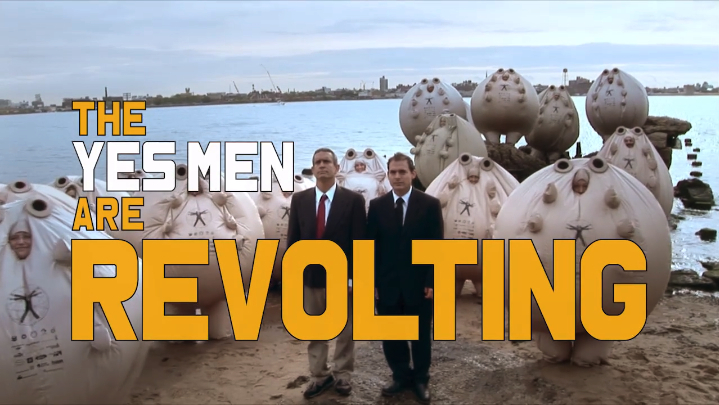
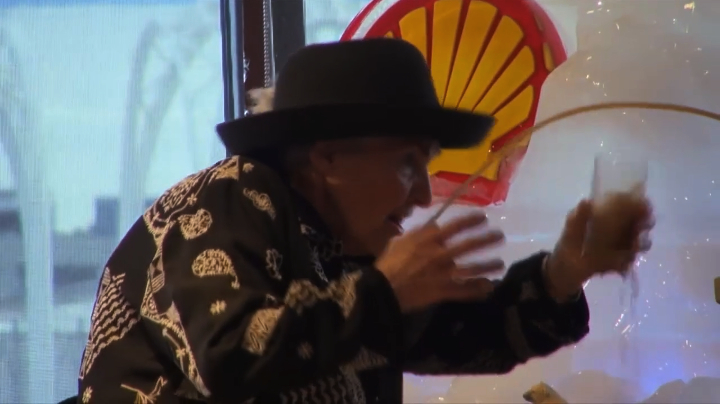


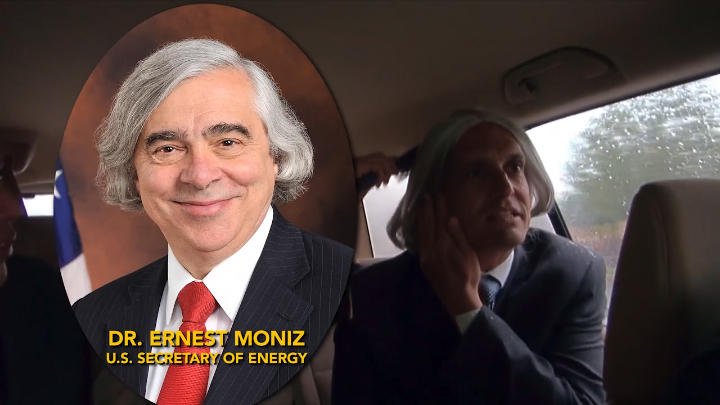
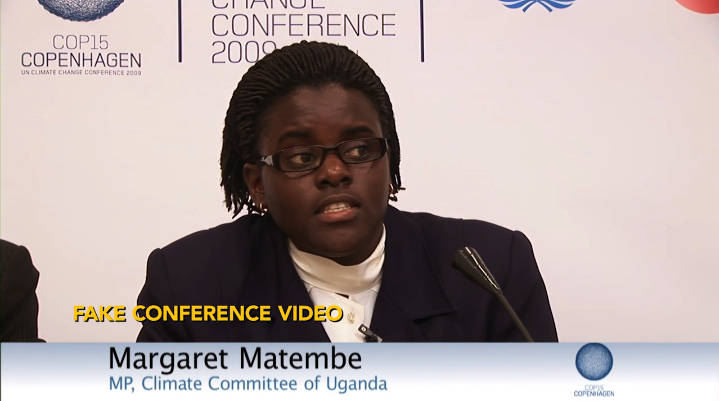
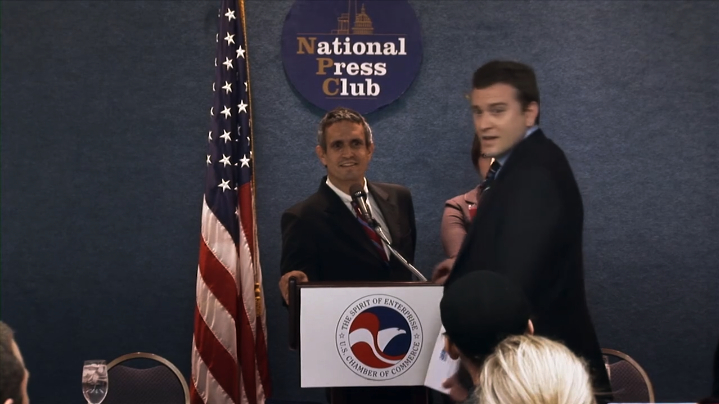
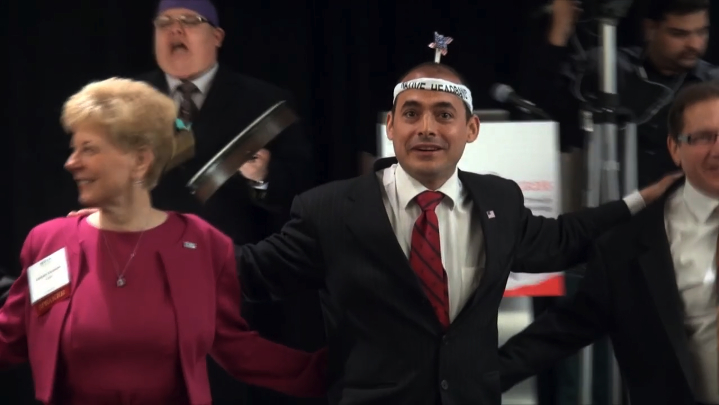

Great discussion and connection to Brecht! Just saw this movie last week at Other Cinema, what really struck me, in addition to all the wonderful perspectives above, was the way the Yes Men use their wild imaginations to pull together stunts that have to ability to shock and instantly draw in any passerby. Their focus on fantastical displays similarly confuses and also excites those in the know! The SurvivaBall, oil and polar stunts all rely on elaborate shows to provoke the public out of their everyday. Curious to see what they come up with next, what doooo you think????